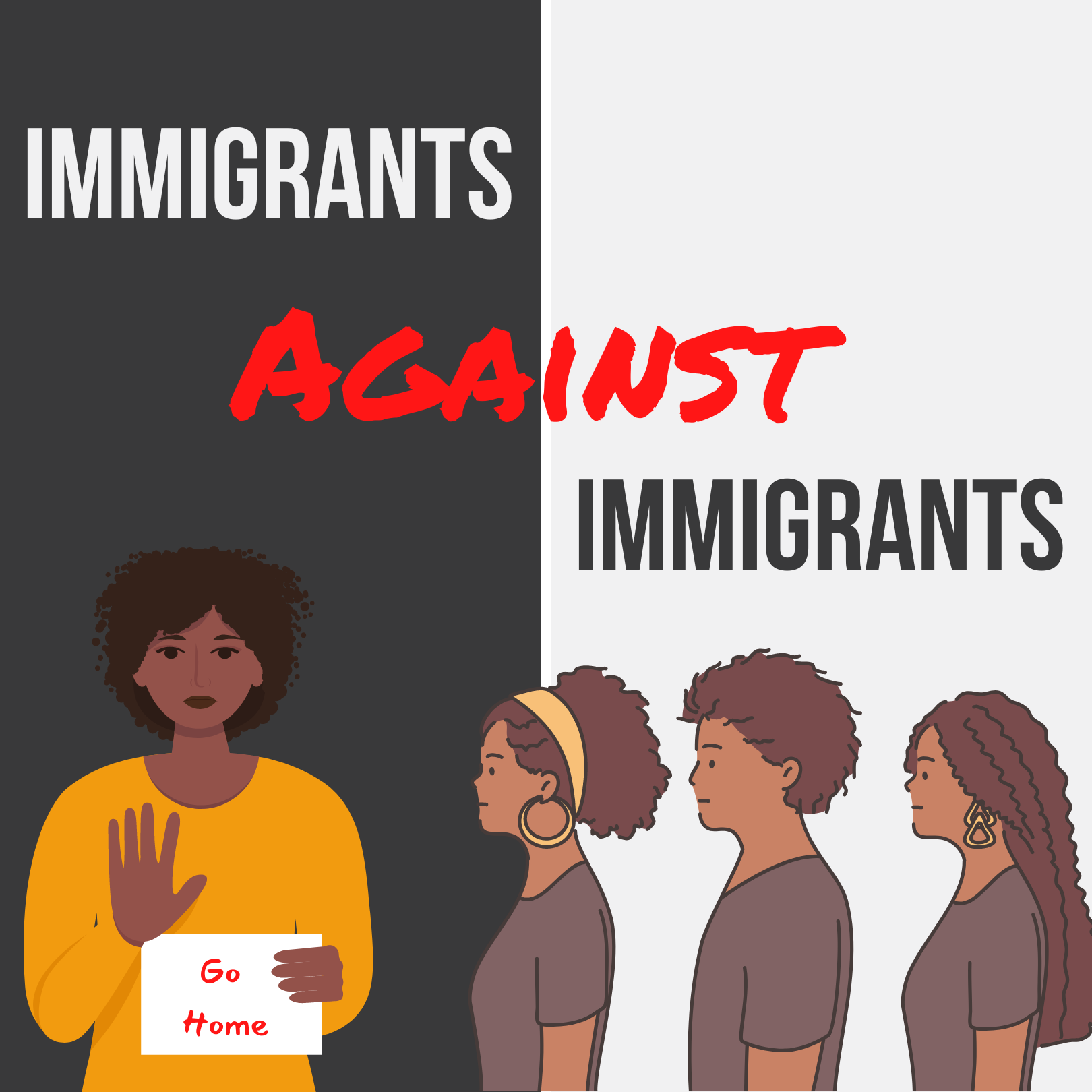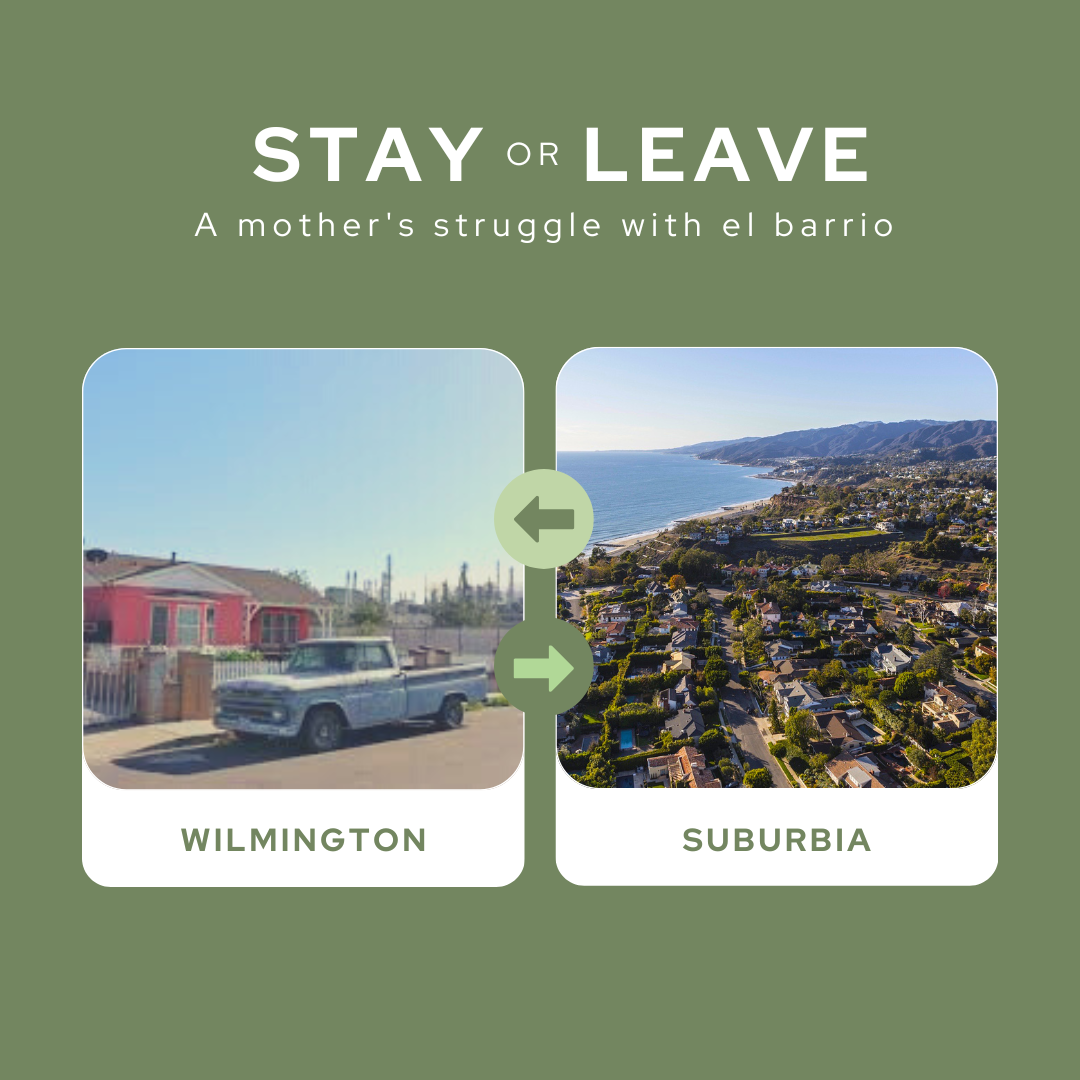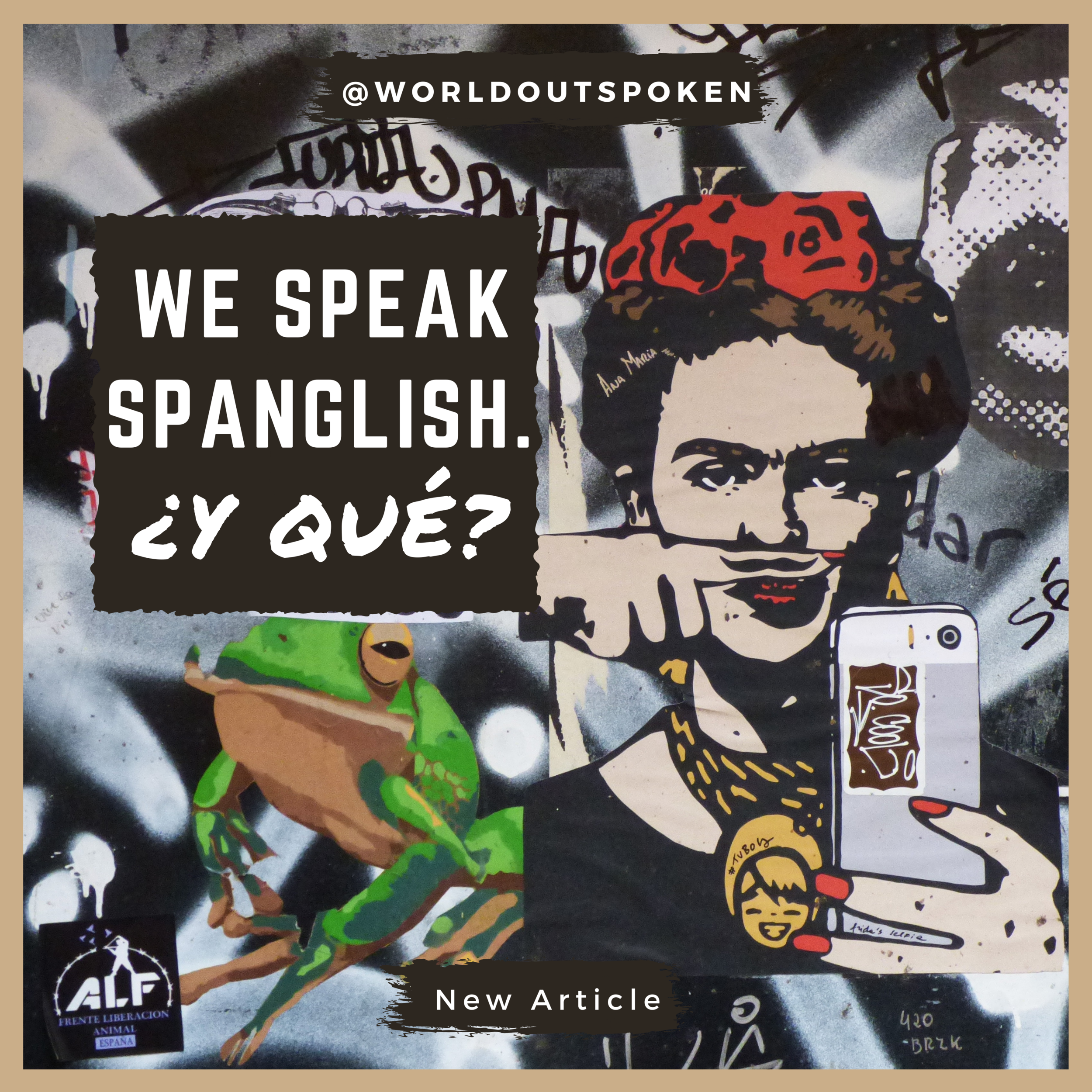We were in our dining room table tomando cafecito and chit chatting. The TV had remained on in the background and Noticias Univision announced that there was a new wave of Central American migrant caravans approaching la frontera. She reacted angrily and exclaimed, “Nada más vienen a robar, a aprovecharse del gobierno y a quitarnos lo que es nuestro” (They only come here to steal, to take advantage of the government and to suck us dry). I had heard this phrase before, but never in my home and certainly never in Spanish. Her comments me cayeron como un balde de agua fría – they destabilized my narrative.
As a second-generation Mexican-American immigrant, I carry my family’s migration story with pride and a great sense of responsibility. Part of my identity was formed by that journey. Although I was born in the U.S., never had to flee my home in search of better opportunities, and have not suffered persecution based on my citizenship status, I am intimately connected to these stories through my family members. As a Christian, I am also linked to the migrant narrative through the Bible. Jesus was an immigrant,[1] and the Bible is filled with stories of people who had to migrate in order to escape violence, poverty, or because they felt God’s calling in a new land.
I’ve carried, protected and defended my immigrant family’s inherent value in a society that devalues them and fails to recognize their full humanity. I’ve clung to the biblical truths that exhort us to love and care for all people, particularly those in vulnerable positions.[2] I am, to a certain extent, accustomed to the anti-immigrant rhetoric repeated by individuals outside of the immigrant community. I am familiar with the misapplied Romans 13 verse used by Christians who oppose (undocumented) migration, but this rhetoric had now infested my home and disrupted my story.
What was most destabilized were the college applications that I wrote, proudly referencing my family’s migration journey; the lesson plans I prepared for students in which we explored migrant stories in the Bible; the scholarship I produced about the immigrant experience; my multiple conversations with my son about his grandparents’ journey so that he wouldn’t forget and become one of those third-generation Mexican-Americans who ignores the plight of immigrants, or worst yet, resents it. I was haunted by this question: “Does my advocacy and story make sense now that my relative declared herself anti-immigrant in our dining room table?”
We’re used to telling simplified stories of ourselves and others. Dichotomous stories have become our templates: villain/hero, victim/victimizer, good/bad. However, our reality as humans is a lot more complex. In fact, biblical narratives do not rely on utopian, unidimensional characters. The stories told in the Bible direct us towards God’s perfect love, not to our own perfection. As humans, we embody positive and negative traits, and it is only by God’s redeeming grace that we are salvos.
When she pronounced herself anti-immigrant my story became muddied. Frankly, I wanted to pretend she had never uttered those words, but that conversation haunted me. She was a first-generation immigrant herself. How could she speak so vilely about immigrants? Renowned journalist María Hinojosa’s memoir Once I was You describes how her positionality as a 1.5 generation immigrant made her empathetic to the suffering of immigrants and keenly aware of the injustices committed against this group. But my relative, unlike María, had not developed a deeper sense of awareness or empathy. “Once you were them,” I told her, “How can you say all this?”
This article attempts to answer that question. My goal is to engage in an honest, even if difficult, reflection about why members of the Latino community, particularly immigrants, hold anti-immigrant notions. To accomplish this, in the following sections, I will hypothesize on the potential factors that contribute to the existence of an anti-immigrant rhetoric upheld by immigrants themselves.
Hypothesis #1: A distorted view of justice
Last year, when I first heard the rumors about the cancelation of student loans, my immediate reaction was anger. “I’ve paid thousands and sacrificed so much! Why do these people now get to have their loans canceled?” I thought.
My angry reaction about the cancelation of student debt and the belief that, “If I suffered, others must too” was selfish and absurd. In a way, we’ve normalized a warped vision of justice in which we believe that we are entitled to sustaining oppressive systems on the basis that those systems oppressed us. We tend to feel as though the suffering of others somehow justifies our own, but two injustices don’t equal justice. Your suffering doesn’t erase or ameliorate mine. We consider it unfair if others “get a pass” or “have it easier than us.” Some immigrants believe that if they had to go through all those troubles, so do others. We can accept God’s free gift of salvation but cannot tolerate when others are “freely rewarded.”
The parable of the unforgiving servant (Matthew 18:21-35) tells the story of a man who pled for mercy for not being able to pay his debt. After the King shows him mercy and forgives his debt, the man meets a fellow servant that owed him money, demands payment and throws him in jail when he could not pay. Many immigrants are pleading to be let in as they try to find refuge for a multitude of reasons, and some immigrants who are now living in the States refuse to welcome them. In a 2015 survey conducted by the American Values Atlas, 10% of immigrants who had lived in the States for a year or less thought that immigrants threatened traditional American customs and values, and 14% of immigrants who had resided in the U.S. for 20 years perceived newcomers as threats.
In times of financial hardship immigrants become economic scapegoats. “I hear they’re getting free health care,” she said trying to strengthen her case, “and I have to pay for mine out-of-pocket.”
Placing blame on the most socially dispossessed groups of people in our society during times of economic adversity is not uncommon. Perhaps immigrants that have been in this country for decades feel an added sense of frustration as they realize that the promise of the American Dream was not fulfilled in the ways they had imagined and la mentalidad cangrejo or “if I can’t have it, why should others,” prevails. Instead of binding together to help each other, we tear one another down and call that fair, but Christ points us in the direction of love, humility and compassion.
Hypothesis #2: Racism, colorism & nationalism
Although we might be more accustomed to thinking about the evils of racism within a white vs. POC framework, the truth is that racism and colorism also operate within our own communities. Being a Latin American immigrant doesn’t automatically place everyone on an “equal playing field;” racism and colorism don’t disappear in immigrant spaces and these corrupt ideologies often impact the experiences of immigrants in the country of destination.
Pew Research (2021) found that Latino-on-Latino discrimination is almost as common as discrimination experienced from other ethnic groups, and skin color and nativity seem to play a role; 41% of Latinos with darker skin report receiving unfair treatment by other Latinos, compared to 25% of lighter skin Latinos. Latinos born in Latin America are 9% more susceptible to suffering discrimination from other Latinos. Furthermore, close to 50% of Latinos reported hearing racially insensitive or racist remarks about other Latinos often (13%) or sometimes (35%).
In a skin tone stratified society that privileges fair skin, skin color also plays a role in the experiences encountered by immigrants. A recent report published by Freedom for Immigrants revealed that Black immigrants are six times more likely to be placed in solitary confinement; that although Black immigrants only make up 7% of all non-citizens in the U.S., they account for 20% of immigrants detained on criminal grounds. Indigenous peoples are also disproportionately affected by anti-asylum policies, face linguistic exclusion within immigration services, and are victims of anti-Indigeneity racism (Amnesty International 2021).
Donate Today
Support the work of World Outspoken by donating today. Each donation helps product resources and training for the church in-between.
There are also elements of nationalism that play a role in Latino intragroup discrimination. If you are part of a Mexican family, you’ve probably heard many derogatory comments said by your family about Central Americans. The anti-Central-American attitudes predate the migrant caravans, but the influx of Central Americans traversing Mexico has strengthened feelings of hostility and rejection felt by Mexicans towards the Central American community. In fact, a 2019 survey conducted by Washington Post and Reforma found that 6 in 10 Mexicans (who lived in Mexico) considered migrants to be burdens and 55% supported deporting migrants. One would assume that Mexicans, many of whom have family members living abroad as immigrants, would welcome immigrants with open arms.
As a Church, our call is to welcome everyone, not only those who look like us, speak like us or have the same passport as us. Rev. Alexa Salvatierra reminds us that, “The Church is called to embody the boundless love of God by being a community of radical welcome to all God’s children.” Radical welcome embraces the wholeness of the guest and allows engagement in mutually life-giving relationships.
Hypothesis #3: Whiteness as an ideology that also infects immigrants of color
Whiteness is an ideology that can be upheld by white and non-white people alike; much like machismo, a male-centered ideology that is, on many occasions, supported and perpetuated by women. It is perplexing, but we must recognize that as social beings we breathe the same air; whiteness, in this country, is the polluted air we all breathe. Survival is the name of the game for many first-generation immigrants and “the desired proximity to whiteness and white acceptance, and the temptation to protect it once you have it, is a survival mechanism” (Vu). Perhaps the animosity felt by first-generation immigrants towards other fellow immigrants is birthed out of decades of contorting their identities in white-appeasing ways for the purpose of fitting into a society that views whiteness as normal and everything else, as undesirably foreign.
People of color who uphold whiteness and by extension, immigrants who oppose immigration, seem to be preposterous and self-harming, but internalized oppression leaves us all exposed. In his seminal work, Pedagogy of the Oppressed, Paulo Freire claims that the oppressor’s concern is to change the consciousness of the oppressed in order to convince them that oppression isn’t actually occurring, enabling conformity and uniformity. According to Frantz Fanon, the “breaking in” of the oppressed happens when the oppressed themselves admit “loudly and intelligibly the supremacy of the white man’s values” (The Wretched of the Earth). Internalized oppression occurs when we turn against ourselves, our families, and our communities and we take to heart and mind the lies of the enemy. This type of oppression doesn’t always manifest in loud and clear ways; instead, it lurks in our subconscious, inhabits our deepest thoughts, and expresses itself in the most unexpected ways. Whiteness contaminates our mind. We suck in this polluted air for so long that it becomes our norm, even as it destroys us. This is why people like my relative can have first-hand experiences, intimately know the stories, bear the oppression, and still become their community’s most avid persecutor.
Final Thoughts
Sometimes the stranger becomes known, the foreign land becomes familiar, and the powerless gain power. Our circumstances may change, but our compassion, empathy and love for each other should not wane. Oppression, says Freire, “is necrophilic; it is nourished by love of death, not life” and God is the antithesis of death.
According to a Pew study, people’s religion greatly influences their views on abortion, the death penalty, and homosexuality, but not immigration. Similarly, a LifeWay Research poll found that only 12% of evangelicals think biblically about immigration, citing the media as more influential on their immigration views. There seems to be an obvious disconnect considering that the Bible speaks amply about immigration and references the foreigner extensively[3]. God doesn’t speak to us tangentially about immigrants; in fact, God commands us to welcome the foreigner (Leviticus 19:34), treat them justly (Deuteronomy 27:19; Exodus 22:21) and care for them (Matthew 25:35-40; Deuteronomy 10:18-19).
Sinful ideologies can also infect the very same people we’re trying to defend, but our advocacy for the vulnerable should always be guided by God’s unwavering word and His love for immigrants.
“El inmigrante militante”
Aún huelo tu aroma en ese recoveco en el cual te escondiste. Aún siento tu sudor y escucho el pálpito de tu corazón al intentar cruzar desapercibidamente. Anhelabas con que ese espacio minúsculo, carente de luz, te condujera hacia tu nuevo hogar. Y ese hogar te dio tanto, pero también te quitó todo. Treinta años después, la casa de oro te construyó, y el corazón de piedra te formó. Ahora, tú vigilas la frontera, destruyendo sueños ajenos. Pero esos sueños también eran los tuyos. Formaste enemigos imaginarios, volcándote contra ti misma. Creíste la mentira del enemigo, sabiendo por experiencia propia la verdad. Recuerda, hija, el día en que tú saliste de Egipto.
About Dra. Meduri Soto
As an academic from el barrio, Dra. Meduri Soto strives to engage in scholarly work that honors and gives visibility to her community. Her faith drives her passion for justice as she seeks to reveal the ways in which certain language ideologies are constructed to operate unjustly against our communities. Her work acknowledges language as a powerful tool and promotes linguistic diversity in its different manifestations. Bicultural and bilingual identities are at the center of Dra. Meduri Soto’s work. She is a Spanish professor at Biola University where she teaches second language and heritage language learners. To learn more about her work, follow her on Instagram: @la.dra.itzel
Footnotes
[1] See Octavio Esqueda’s What’s Your Immigration Status? Divine (2017)
[2] See Robert Chao Romero’s The Brown Church (2020).
[3] For theological references that center immigration, consult the Mygration Christian Conference.
Articles like this one are made possible by the support of readers like you. Donate today and help us continue to produce resources for the mestizo church.















